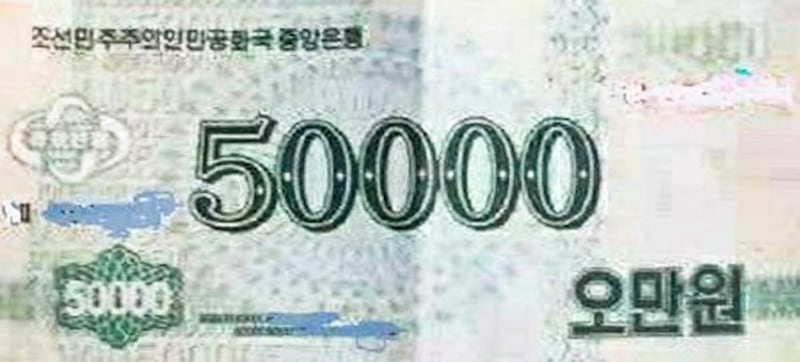North Korea’s Central Bank has printed a 50,000 won (U.S. $8.30) money voucher worth 10 times its highest currency denomination, photo evidence obtained exclusively by RFA has revealed.
North Korean paper currency is available in denominations ranging from the practically worthless 5 won ($0.00083) note to the 5,000 won note, worth less than $1. People generally use a mixture of foreign currencies like dollars and Chinese yuan in conjunction with the North Korean won to pay for goods and services.
RFA received photos of the new voucher from the J.M. Missionary Union, a Seoul-based organization with knowledge of the situation.
The note bears the name of the Central Bank of the DPRK with an issue date of “Juche 111,” the current year in the North Korean calendar that starts in 1912, the birth year of national founder Kim Il Sung. The background shows Mt. Paektu, a mountain on the Sino-Korean border that is sacred in Korean culture.
RFA was unable to confirm how many 50,000 won notes have been printed or whether they are in circulation. The organization said the voucher was issued earlier this year and is in use in Pyongyang.
South Korean sources who requested anonymity due to the country’s presidential transition period told RFA’s Korean Service that North Korea issued a high-denomination money coupon earlier this year but could not confirm that it was a 50,000 won voucher.
They said that the high denomination vouchers were for transactions between businesses.
South Korea’s Ministry of Unification could not confirm whether North Korea has issued money vouchers worth more than 5,000 won ($0.83), which the Central Bank of the DPRK did in the second half of last year.
“Issues related to the issuance of the [5,000 won] money coupons have been identified through messages to North Korean escapees … but the purpose of their issuance and distribution have not been specifically identified,” the ministry told RFA.

During a South Korean National Assembly audit last year, the National Intelligence Service (NIS), Seoul’s spy agency, confirmed that the 5,000 won vouchers were in circulation.
The NIS said in their report that the vouchers were issued because North Korea lacks the paper and ink necessary to print money due to the suspension of imports at the start of the coronavirus pandemic in 2020.
Imports resumed on a limited basis at the beginning of this year, but trade volume has not yet reached normal levels.
The issuance of money vouchers also may indicate that North Korea is attempting to avoid inflation by not printing actual currency, the Bank of Korea, South Korea’s central bank, said in a report last month, which did not mention vouchers in the 50,000 won denomination.
The report said cashflow in the North was disrupted due to the economic slump and the vouchers are a means to increase the money supply, possibly for use in transactions between companies, while North Korean authorities can keep the companies’ cash in reserve.
“Money should circulate. From the authorities’ point of view, they circulate money, but it’s not coming back to them,” Lim Song, an economist that focuses on North Korea at the Economic Research Institute of the Bank of Korea, told RFA.
“The central bank has to print money to circulate money, but that will cause inflation, so instead of paper bills, they are circulating money coupons which they can convert when the economic situation gets better,” he said.
Translated by Claire Lee and Leejin Jun. Written in English by Eugene Whong.
